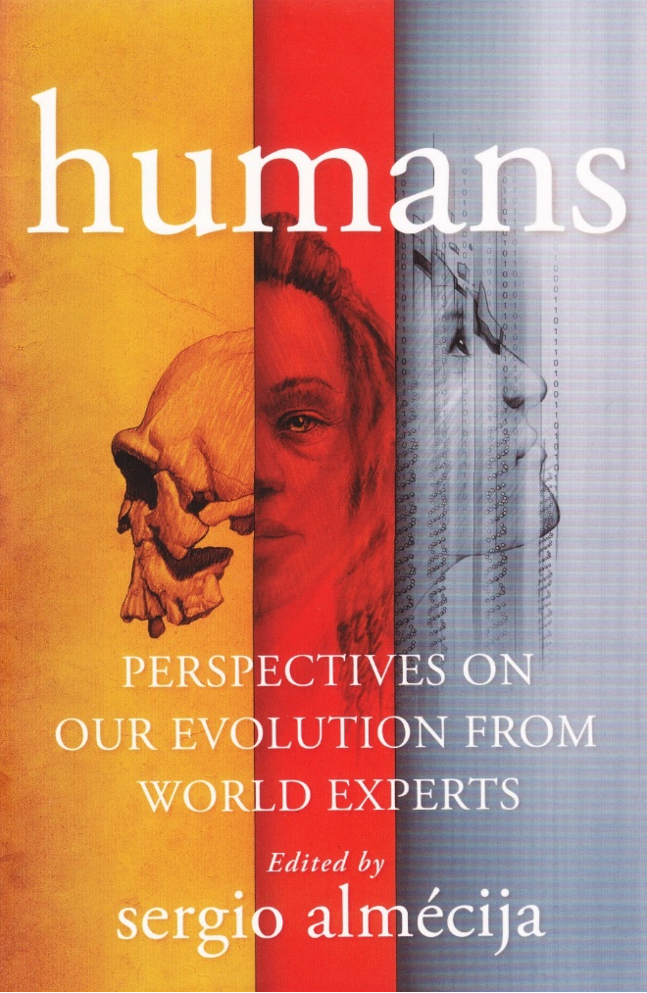Reviewed by Andrej Spiridonov (Vilnius University, Lithuania)

Almécija, S., ed. 2023. Humans: Perspectives on Our Evolution from World Experts. Columbia Univ. Press. Columbia University Press, NYC. 520 pp. ($104.00 cloth, $26.36 paper, $25.59 e-book with 20% PS discount.)
This book, edited by AMNH paleoanthropologist Sergio Alméija, has a peculiar format: a list of questions and their answers by an array of specialists from widely differing disciplines. The questioned are organized in chapters forming a sequence of closeness to the “human soul,” so to speak. This progression organizes scientists and their opinions, while forming profession-bounded trends from macroevolutionary palaeontologists, to primate paleomammalogists, to paleoanthropologists, to modern primate biologists and cultural anthropologists, to finally scientists of non-evolutionary disciplines, such as lawyers, psychologists or popular technology journal editors or public scientific personalities. This organization and the choice of interviewees is a refreshing one—it’s rare you can directly compare thoughts on some of the most profound questions on human nature from scientists raised in sharply differing traditions of thought. All invited scientists answered the same set of questions, such as “your beginning”, “game changer [discovery]”, “amazing fact”, “time travel”, “future evolution”, “evolutionary lessons”, “driving factors”, “[are humans] special?”, “religion and spirituality”, “future evolution”, “advice”, and “inspiring people”.
This personal-point-of-view approach to identifying interesting and promising directions in the study of human origins gives a unique opportunity to look at the diversity of paths toward science, riddled with subject-specific discoveries and emerging unique world-views on the nature of humans, and how we should approach it. While reading the origin stories, you can feel the huge importance of science outreach. A majority of anthropologists, especially paleoanthropologists, were profoundly influenced in the choice of their profession and career paths either by works of Charles Darwin or Stephen Jay Gould, with some role of other scientists or contingencies of early childhood or the college they attended. (This reveals the importance of teaching paleontological subjects not only to the core audience but also to make it as widely accessible as possible, because you don’t really know from which direction the talent will come).
The “amazing fact” question invokes quite a diverse set of responses, which is highly dependent and correlated with the study subjects of responding scientists. The question reveals their passions. Similarly riveting is the question on time travel: you can see that the time depth of the imagined time travel is directly related to the time depth of typical studies of interviewed scientists. This question reveals the mental worlds in which their research causalities reside. It was interesting to notice that during the transition from paleontologists to neontologists, there was a similar transition in time-travel direction from past to future. Similarly, there are very different outlooks on the capabilities and roles of humans in the evolution and our potential for the future. Paleoanthropologists and biological anthropologists almost unanimously are pessimistic about our prospects, even in the relatively near future of hundreds-to-thousands of years, and the majority are almost certain in our (self-)destruction in the shallow geological future. In contrast, the specialists from other fields—such as medicine, psychology, mathematics and philosophy—have rosier progressivist perspectives of humans merging with technologies in future utopias (or dystopias, depending on the outlook). In general, the interviewed set expresses a contingent and fundamentally unpredictable nature of future human evolution (beyond the shortest time scales and most trivial modifications of the physical character of the body).
Humans, and the closest primates, are a uniquely densely studied clade of animals, and the diversity of scientists presented in this book shows the diversity of perspectives on the evolutionary factors that molded the current human phenotype. While some researchers are optimistic on the hard inference of what made us humans, others express their opinions that probably millions of unrelated and unique combinations of events resulted in Homo sapiens, thus dooming the quest of revealing the process of some universal “anthropogenesis.” Even though, in the light of the paleontological context, the Recent geological past and the fossil record are rather dense, we still should keep in mind that we are talking about millions of years of complex biological, physical, and behavioral interactions in complexly structured space over myriads of events in time, of which just a small subset have received sufficient attention or have a good basis of physical evidence. Human evolution offers a complex, sometimes even insurmountable, challenge to solve. But is it because we are unique in the biological world? Or is it because we have such a multifaceted perspective that inevitably induces irreconcilable differences in our outlooks? Or, maybe, this apparent complexity is partially the result of our self-absorption, which precludes the search for commonalities with other life forms? This book gives widely varying perspectives, and I think that many readers here will find their own inspirations in understanding the nature of humanity or the phenomenon of evolution in general.

